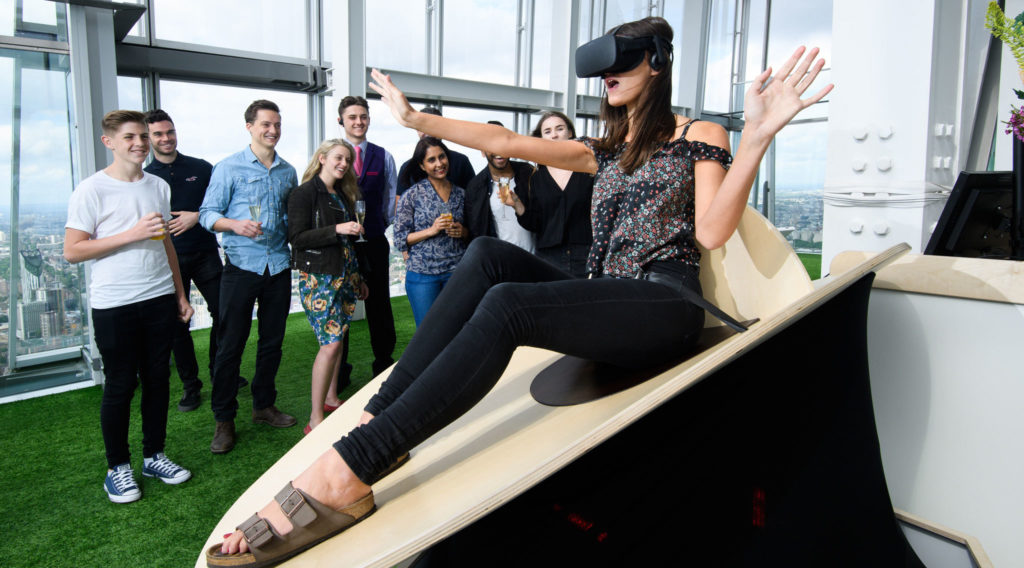A “location-first” mentality is leading to a whole new wave of location-based immersive entertainment.
Strictly speaking, all experiences are location-based (save for the ones we have in our dreams and even then technically they’re bed-based). Instagram posts are tagged with #FOMO inducing lifestyle destinations. A scan through your camera roll will remind you where you took that perfect if unnecessary shot of your espresso and tonic caffeine hit. Snapchat entices you to add venue info stickers to your random posts. The location where an experience takes place is just about as important as the thing you were doing at that spot at that moment in time.
So how does VR play into this then, when the assumption is it either requires us to be hardwired into a gaming PC or safely contained within the strict four walls of our Oculus Quest guardian boundaries? In homage to the 90s laser tag centres, a number of go-there-to-do-it retail-style VR experiences have cropped up both inside and beyond the manicured walkways of shopping malls, inviting guests to participate in IP-driven haptic “immersathons” that function as pay-to-play extensions of movie marketing cycles.

But beyond the idea of paying to be marketed to, a trend we’re seeing more and more of as the lines between entertainment and advertising continue to blur into extinction are alternative models for location-based experiences that take the specificity of their location as their starting point, rather than thinking of location as simply a site at which to house a productised VR activation.
A number of recent pop-ups in London UK demonstrate the potential of this new way of thinking in regards to location-based experiences. Premiered on the UK’s Channel 5 Gadget Show, VRBungee was a 6 month R&D project that looked at how creative VR could be used to complement and amplify real-world adrenaline sports. The participant slides on an Oculus Quest to find themselves inside a real time Roman Colosseum before taking the leap of faith. Real-time tracking and depth sensing from the Oculus Quest’s front-facing cameras blend the physical sensation of falling with a simulated face-first descent towards the arena floor. Timed to the point of impact / snap back of the bungee cord, the participant unexpectedly sees the floor give way and finds themself hurtling even further down into a subterranean hell à la Dante’s Inferno.
Somewhat less physical, but equally scream-inducing, is the VR Sky Slide experience. Initially launched at The Shard (London’s tallest building), the proprietary sit-on VR ride simulates a virtual helter-skelter around the tower guests are visiting. The physical motions of haptic seating device are synced to the digital pitches and turns in-headset, immersing the rider in a vertigo-inducing experience that would be utterly impossible to recreate in real life.
The company behind these activations is London-based createch studio Happy Finish. The productised lease and license or rev-share product is customized for each location install, with a localized live-action skybox stitched and finalized in real time, simulating a whichever city the guest is visiting.
For both of these VR-driven activations, the locations at which they take place are not only central to the creative driving the experience, but also integral and additive to that experience. In contrast to other commercialized location-based VR experiences, VRBungee and Sky Slide offer more than just a chance to play with technology guests don’t have on hand at home.
As cost barriers to at-home access continue to fall, LBEs need to have this idea of the location as additive / integral front and centre of mind. This shift of focus away from retail-style VR showrooms may allow location-based experiences to fulfill their potential not only as sustainable long term revenue opportunities, but also as new creative spaces.
Following the Covid-19 global crisis (yes sorry to go there again!), tourism and the leisure industries will be looking for innovative ways to lure timid audiences out of their homes and back into their establishments. VR now has an opportunity to be that gateway drug.
The post How Location-Based VR Is Finally Breaking Out Of Its Box appeared first on VRScout.
from VRScout https://ift.tt/2xBgDMN
via IFTTT
No comments:
Post a Comment